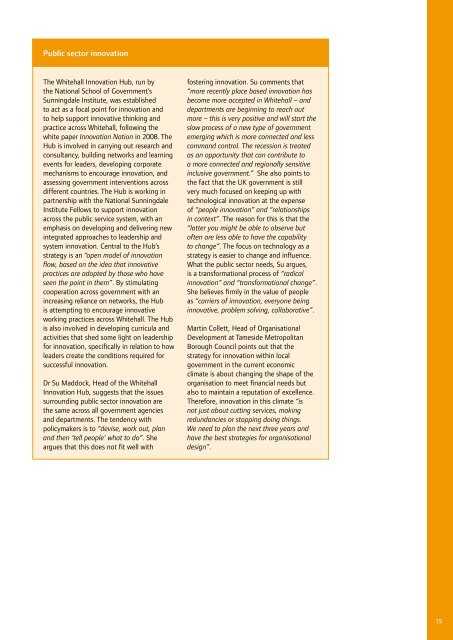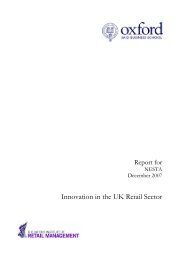Everyday innovation report - Nesta
Everyday innovation report - Nesta
Everyday innovation report - Nesta
Create successful ePaper yourself
Turn your PDF publications into a flip-book with our unique Google optimized e-Paper software.
Public sector <strong>innovation</strong><br />
The Whitehall Innovation Hub, run by<br />
the National School of Government’s<br />
Sunningdale Institute, was established<br />
to act as a focal point for <strong>innovation</strong> and<br />
to help support innovative thinking and<br />
practice across Whitehall, following the<br />
white paper Innovation Nation in 2008. The<br />
Hub is involved in carrying out research and<br />
consultancy, building networks and learning<br />
events for leaders, developing corporate<br />
mechanisms to encourage <strong>innovation</strong>, and<br />
assessing government interventions across<br />
different countries. The Hub is working in<br />
partnership with the National Sunningdale<br />
Institute Fellows to support <strong>innovation</strong><br />
across the public service system, with an<br />
emphasis on developing and delivering new<br />
integrated approaches to leadership and<br />
system <strong>innovation</strong>. Central to the Hub’s<br />
strategy is an “open model of <strong>innovation</strong><br />
flow, based on the idea that innovative<br />
practices are adopted by those who have<br />
seen the point in them”. By stimulating<br />
cooperation across government with an<br />
increasing reliance on networks, the Hub<br />
is attempting to encourage innovative<br />
working practices across Whitehall. The Hub<br />
is also involved in developing curricula and<br />
activities that shed some light on leadership<br />
for <strong>innovation</strong>, specifically in relation to how<br />
leaders create the conditions required for<br />
successful <strong>innovation</strong>.<br />
Dr Su Maddock, Head of the Whitehall<br />
Innovation Hub, suggests that the issues<br />
surrounding public sector <strong>innovation</strong> are<br />
the same across all government agencies<br />
and departments. The tendency with<br />
policymakers is to “devise, work out, plan<br />
and then ‘tell people’ what to do”. She<br />
argues that this does not fit well with<br />
fostering <strong>innovation</strong>. Su comments that<br />
“more recently place based <strong>innovation</strong> has<br />
become more accepted in Whitehall – and<br />
departments are beginning to reach out<br />
more – this is very positive and will start the<br />
slow process of a new type of government<br />
emerging which is more connected and less<br />
command control. The recession is treated<br />
as an opportunity that can contribute to<br />
a more connected and regionally sensitive<br />
inclusive government.” She also points to<br />
the fact that the UK government is still<br />
very much focused on keeping up with<br />
technological <strong>innovation</strong> at the expense<br />
of “people <strong>innovation</strong>” and “relationships<br />
in context”. The reason for this is that the<br />
“latter you might be able to observe but<br />
often are less able to have the capability<br />
to change”. The focus on technology as a<br />
strategy is easier to change and influence.<br />
What the public sector needs, Su argues,<br />
is a transformational process of “radical<br />
<strong>innovation</strong>” and “transformational change”.<br />
She believes firmly in the value of people<br />
as “carriers of <strong>innovation</strong>, everyone being<br />
innovative, problem solving, collaborative”.<br />
Martin Collett, Head of Organisational<br />
Development at Tameside Metropolitan<br />
Borough Council points out that the<br />
strategy for <strong>innovation</strong> within local<br />
government in the current economic<br />
climate is about changing the shape of the<br />
organisation to meet financial needs but<br />
also to maintain a reputation of excellence.<br />
Therefore, <strong>innovation</strong> in this climate “is<br />
not just about cutting services, making<br />
redundancies or stopping doing things.<br />
We need to plan the next three years and<br />
have the best strategies for organisational<br />
design”.<br />
15







